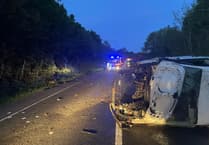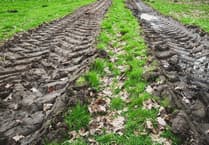THE cost of rural theft in Devon and Cornwall rose by more than a quarter to an estimated £690,000 in 2020, according to figures released this week by rural insurer, NFU Mutual.
More costly crimes have been committed in the region, as determined thieves got more ‘bang for their buck’ by focusing on high-value targets such as Global Positioning Systems, quad bikes and livestock.
Devon and Cornwall’s sharp rise is in contrast to a 20.3% fall in the estimated overall UK bill for rural crime, revealed in NFU Mutual’s 2021 Rural Crime Report.
The wider South West region was also the only part of the UK where livestock theft costs increased significantly in 2020, with a 39% rise, while the UK saw the cost of rustling fall by 25% to £2.3m.
In response to ongoing regular thefts of sheep in remote areas such as Dartmoor, NFU Mutual has joined forces with Devon and Cornwall Police to launch a new initiative to enable local residents and countryside visitors to report suspicious activity to local farmers.
The Devon Livestock Initiative is providing farmers with gate signs which include the times that stock are normally moved and asking members of the public who see sheep being moved outside these times to call a local phone number.
Roz Hills, NFU Mutual Regional Manager for the South West, said: “Despite coronavirus restrictions, determined criminals have found opportunities to continue to target the local countryside. However, despite the increase in the cost of rural theft, Devon and Cornwall still have rural crime levels well below other areas in the UK.
“There’s no doubt that when we work together with police, farmers, communities and other rural organisations to tackle rural crime, it can make a real difference.
Support
“We believe this is vital support because rural crime isn’t just about money to replace stolen livestock. It causes disruption, seriously affects farmers’ mental well-being and destroys the trust which enables rural communities to flourish.
“The South West’s sharp increase in livestock theft is a major concern, and we are working closely with Devon and Cornwall Police’s rural team to help bring criminals to justice – and deter others from stealing sheep and cattle.
“Last year also saw sharp rises in other crimes such as dog attacks on livestock which caused appalling suffering to farm animals and huge anxiety for farmers and their families as they dealt with the aftermath.”
Rob Bolt, Neighbourhood Policing Lead for Devon and Cornwall Police, said: “Devon and Cornwall Police are committed to working in partnership to prevent crime in rural communities. In 2019 the force invested in two dedicated rural police officers, which was expanded to four in 2020.
“The force recognises that the offences in this report directly impact on rural businesses and the wider feeling of safety in rural communities. The rural police officers have worked hard to engage with the community to build trust in reporting crime, which enables us to have a true picture on offences to inform our intelligence picture.
“Devon and Cornwall is nationally the largest geographic force and is predominantly rural, and as this report shows, it is still one of the safest places in the county. Devon and Cornwall Police are continuing to invest in additional dedicated rural officers to work with rural communities, businesses and partners to tackle crime and anti-social behaviour.”
For more information on rural crime trends and advice, download the report at www.nfumutual.co.uk/ruralcrime
Stephen Murgatroyd is retired and lives in the small village of St Agnes near the North Cornwall coast. He owns a Land Rover Defender which he uses to get around the local village and surrounding rural area. In April this year though, thieves stole it from his driveway while his family slept.
Stephen explains: “I had arrived home quite late that night as I had been out, it was around 1.30am. I parked my vehicle on the driveway as I normally would. Usually it would be hidden by trees but typically, I had left it further down the driveway as I had been painting the house that week. It could be seen from the road and I suspect that’s why it was taken.”
When Stephen woke up the next morning, he didn’t realise anything was wrong until he received a call from a friend, who is a Police Officer.
Stephen says: “He asked me where my Defender was and when I said it was on my drive he said no it couldn’t be, as he was looking at it while talking to me. It turns out it had been stolen in the early hours of the morning and the thieves had used it to attempt to raid a cashpoint in a nearby seaside town. They’d then dumped it nearby.
“I couldn’t believe it. My friend said it wasn’t the first to be taken and there had been other attempted thefts of Defenders on the same night. They clearly knew exactly what they were doing - I don’t know how they managed to get past the alarm and steering lock to then steal it from our driveway, without disturbing us or any of our neighbours.”
Stephen says the experience affected him in different ways. He says: “My emotions did change throughout the day. It was utter disbelief at first and then when I actually saw my vehicle and knew it could be repaired, weirdly I did not feel too bad.
“However, my emotions changed later in the day when I went for a walk with my wife and daughter and about 400 yards from our house we found the thieves had dumped all of my possessions. Seeing my tool box and personal things dumped in the hedge, that was what hurt me more than anything. We were burgled a number of years ago and that same emotion came back. It’s very unpleasant and can have such an impact on your life, but the thieves don’t think about that.”
First launched in 1948, Land Rovers have become a prized classic vehicle owner’s choice as well as still being used every day on farms across the country. NFU Mutual statistics show Land Rover Defenders continue to be a target for thieves, with farmers and enthusiast owners waking up to find their vehicles gone – or stripped of bonnets, doors and wings. With a black market for parts, many of these beloved classics are dismantled in driveways and farmyards, or taken away.





Comments
This article has no comments yet. Be the first to leave a comment.